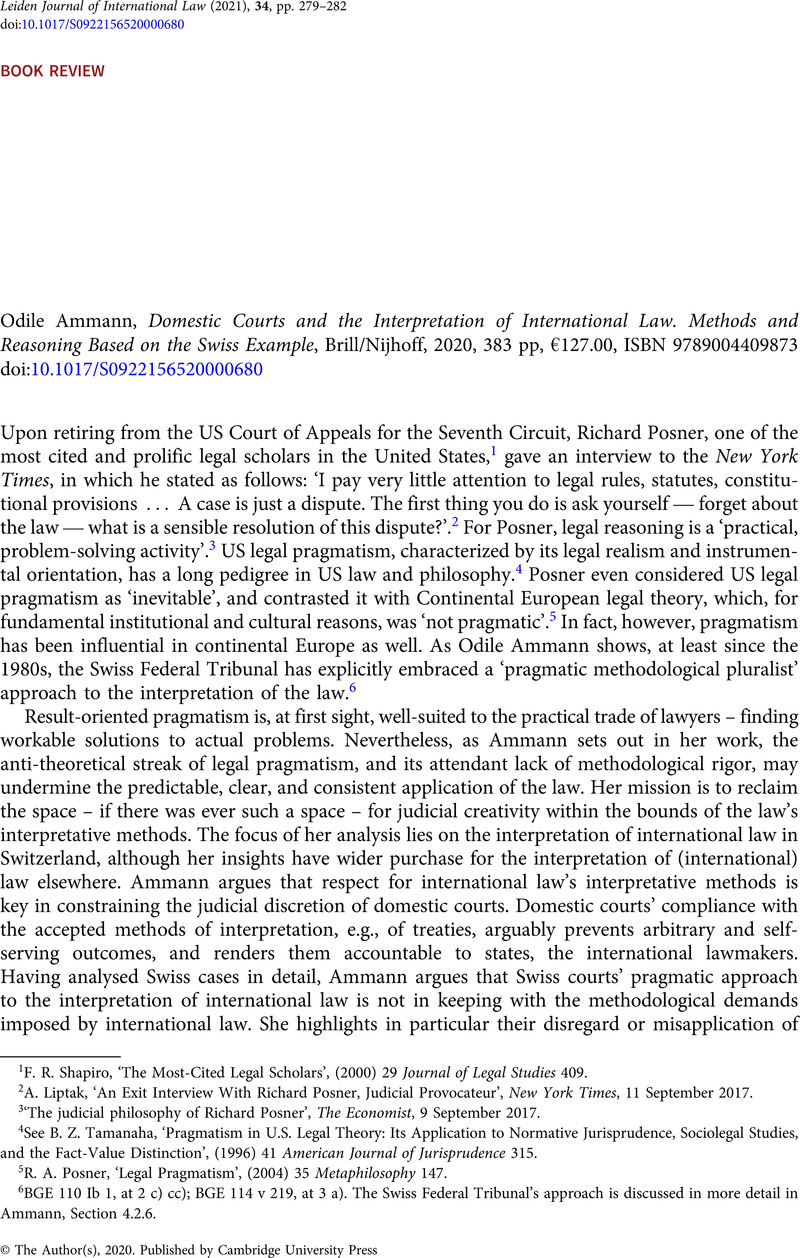Article contents
Odile Ammann, Domestic Courts and the Interpretation of International Law. Methods and Reasoning Based on the Swiss Example, Brill/Nijhoff, 2020, 383 pp, €127.00, ISBN 9789004409873
Published online by Cambridge University Press: 25 November 2020
Abstract

- Type
- Book Review
- Information
- Copyright
- © The Author(s), 2020. Published by Cambridge University Press
References
1 Shapiro, F. R., ‘The Most-Cited Legal Scholars’, (2000) 29 Journal of Legal Studies 409CrossRefGoogle Scholar.
2 A. Liptak, ‘An Exit Interview With Richard Posner, Judicial Provocateur’, New York Times, 11 September 2017.
3 ‘The judicial philosophy of Richard Posner’, The Economist, 9 September 2017.
4 See B. Z. Tamanaha, ‘Pragmatism in U.S. Legal Theory: Its Application to Normative Jurisprudence, Sociolegal Studies, and the Fact-Value Distinction’, (1996) 41 American Journal of Jurisprudence 315.
5 R. A. Posner, ‘Legal Pragmatism’, (2004) 35 Metaphilosophy 147.
6 BGE 110 Ib 1, at 2 c) cc); BGE 114 v 219, at 3 a). The Swiss Federal Tribunal’s approach is discussed in more detail in Ammann, Section 4.2.6.
7 O. Ammann, Domestic Courts and the Interpretation of International Law (2020), 322.
8 Ibid.
9 C. M. J. Ryngaert and D. W. Hora Siccama, ‘Ascertaining Customary International Law: An Inquiry into the Methods Used by Domestic Courts’, (2018) 65 Netherlands International Law Review 1. This lack of rigour is, in fact, not unique to domestic courts’ practice. International courts also tend to underperform. See, e.g., on customary international law ascertainment by the ICJ: S. Talmon, ‘Determining Customary International Law: The ICJ’s Methodology between Induction, Deduction and Assertion’, (2015) 26 European Journal of International Law 417.
10 Ammann, supra note 7, at 323–32.
11 Analysing literature and international databases, such as OUP’s ILDC, Ammann argues that the problem is, indeed, pervasive. See Sections 7.2, 8.2.1, 8.3.1 on respectively treaty law, customary law, and general principles.
12 Ammann, supra note 7, at 196–7.
13 ILC Draft Conclusions on Identification of Customary International Law, With Commentaries, 2018 YILC, Vol. 2 II (Part Two), at 122.
14 Ibid., Draft Conclusion 2 (‘To determine the existence and content of a rule of customary international law, it is necessary to ascertain whether there is a general practice that is accepted as law (opinio juris).’).
15 Ammann, supra note 7, at 196.
16 P. Merkouris, Article 31(3)(c) VCLT and the Principle of Systemic Integration: Normative Shadows in Plato’s Cave (2015), 241–2.
17 P. Merkouris, ‘Interpreting the Customary Rules on Interpretation’, (2017) 19 International Community Law Review 126, at 136 (emphasis omitted). I have myself examined whether domestic courts in fact engaged in customary international law interpretation, and concluded that they indeed do so. See C. Ryngaert, ‘Customary International Law Interpretation: The Role of Domestic Courts’, TRICI-Law Paper No. 006/2019 (2019), forthcoming in P. Merkouris, J. Kammerhofer and N. Arajärvi (eds.), The Theory and Philosophy of Customary International Law and its Interpretation (2021).
18 1969 Vienna Convention on the Law of Treaties, 1155 UNTS 331, Art. 31(3)(b).
19 A. Roberts et al. (eds.), Comparative International Law (2018).
20 Ammann, supra note 7, at 324.
21 Ibid., at 330–2.
22 See legal.un.org/ola/mission.aspx.
23 OLA’s estimated financial resources for 2020 are a paltry US$37,886,800. See Proposed programme budget for 2020 - Part III International justice and law - Section 8 Legal affairs - Programme 6 Legal affairs, UN Doc. A/74/6(Sect. 8) (2019).
24 See opil.ouplaw.com/page/212.
- 1
- Cited by




